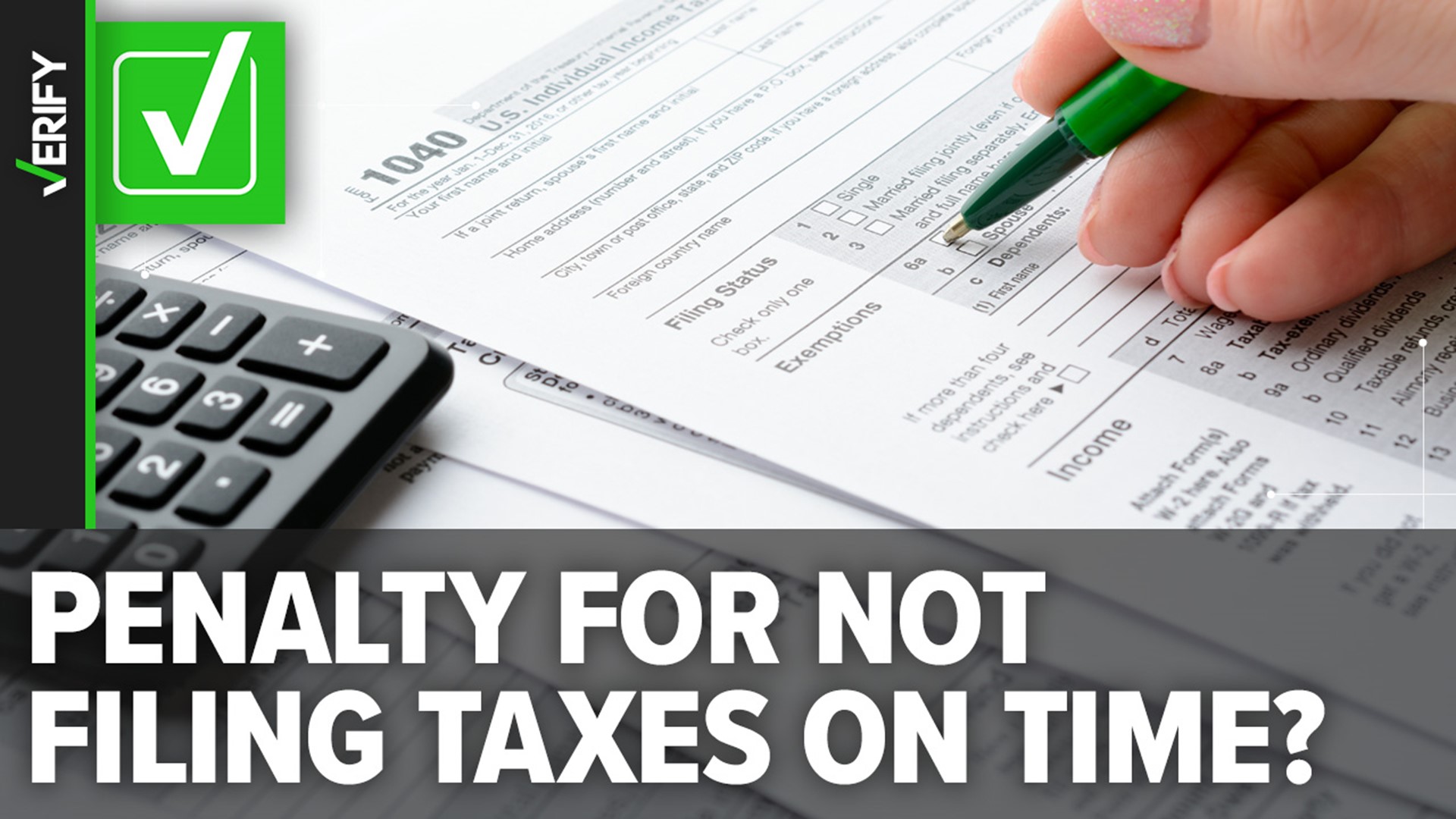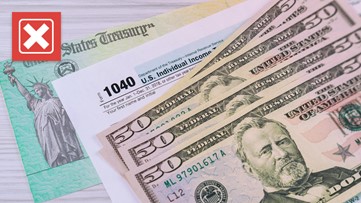This year’s tax filing deadline is Monday, April 15.
A couple of VERIFY readers texted us to ask what would happen to people who didn’t complete their taxes by the filing deadline.
THE QUESTION
Do you have to pay a penalty if you don’t file or pay your taxes on time?
THE SOURCES
THE ANSWER
Yes, if you owe the IRS money, you are subject to a penalty if you don’t file or pay your taxes on time. You’re only exempt from paying on time without a penalty if the IRS owes you a refund.
WHAT WE FOUND
People who owe the IRS money for the 2022 tax year will have to pay penalty fees and interest if they don’t pay their taxes by the filing deadline, with rare exceptions.
People who don’t owe the IRS money for the 2022 tax year, such as people getting a tax refund, don’t have to pay penalties for missing the filing deadline. But those people won’t receive their refund until they file their taxes.
If you owe taxes, don’t file on time and didn’t request an extension
There are three different kinds of penalty fees the IRS imposes on late taxes: failure to file, failure to pay and a combined penalty for taxpayers who don’t file and didn’t pay on time. If you don’t file your taxes by the deadline, you’ll most likely be punished with the combined penalty.
When the IRS penalizes you for both failure to file and failure to pay, the combined penalty is 5% of your unpaid taxes monthly. This penalty adds up each month until it caps out at 47.5%, according to H&R Block.
Even if you can't afford to pay your taxes by the deadline, there is incentive to file your taxes on time, H&R Block says. That's because your penalty is lowered to 0.5% each month, up to 25% of your unpaid taxes.
If your taxes are over 60 days late, the minimum penalty is whichever is less between $435 and 100% of the tax you owe.
You also have to pay interest on your late taxes. The IRS says this interest accrues on everything you owe, including the tax itself, your penalties and the interest already accrued. To calculate your monthly interest, the IRS starts with the federal short-term rate and then adds on another 3%, H&R Block says. The total is what you’re charged.
If you can’t afford to pay your taxes by the deadline, you can apply for a payment plan in which you pay in installments over time. You should also try to pay what you can at the deadline, even if it’s only a small portion of what you owe.
This doesn’t make your failure to pay penalty go away, but it does reduce it. TurboTax says the IRS lowers your monthly failure to pay penalty down to 0.25% of your unpaid taxes if you’re on an approved payment plan. Interest will continue to accrue on unpaid taxes even if you have a payment plan, the IRS says.
If you owe taxes, don’t file on time but do request an extension ahead of the deadline
If you need more time to file your tax return, you can request an extension to file that will give you a new filing deadline of Oct. 15, the IRS says. You will only be granted an extension if you submit your request by the regular due date of your return, unless you live in a disaster area where the IRS gives all taxpayers an automatic extension.
You still have to pay your taxes on time, even if you’re granted an extension, the IRS says. The extension request form includes a line where you estimate the taxes you owe the IRS, and so it recommends you pay this amount when you submit your extension request.
If you don’t submit a payment alongside your extension request, the IRS will likely impose its failure to pay penalty on you. That’s 0.5% of your unpaid taxes each month until it caps out at 25% of your unpaid taxes. You will also owe interest on your unpaid balance.
Penalties and interest are based on how much you owe and for how long, so you should pay as much as you can when you file for your extension, TurboTax says.
“If the IRS thinks your estimate of the amount of tax you owe is unreasonable, it may disallow your extension and assess a late-filing penalty,” TurboTax says. “If you underestimate the amount of tax you owe, you'll likely have to pay interest and perhaps penalty on whatever amount you fail to pay by the original filing deadline.”
You’ll owe a penalty of 0.5% of underpayment every month until you pay off your balance if you paid less than 90% of the taxes you owe, TurboTax says. You won’t be subject to a penalty if you paid at least 90% of the taxes you owe when you file your extension, the IRS 2022 tax guide says.
TurboTax says there is an exception if you’re traveling outside of the country. If you’re outside of the country on tax deadline day, you can request a two-month extension that allows you to avoid the failure to pay penalty during that time, although interest will still accrue on your balance.
Most extension requests are accepted, TurboTax says, but a request could be denied if you make typos or give the IRS out of date information. If that happens, the IRS will notify you by email or letter and give you five days to make corrections.
If the IRS owes you a refund
If you’re expecting a refund and don’t owe the IRS any money, or if you don’t make enough money to be required to file your taxes, then there are no penalties to missing the filing deadline.
“There's no penalty for failure to file if you're due a refund,” the IRS says. “However, you risk losing a refund altogether if you file a return or otherwise claim a refund after the statute of limitations has expired.”
Typically, the IRS gives you three years to file your return in order to receive a refund. If you take longer than three years to file, you’re unlikely to ever get your refund.
TurboTax says you can claim some tax credits only if you file a return, even if you’re otherwise not required to file because of your income.
“More often than not, you’re better off filing a return, even if you don’t need to,” TurboTax says. “That way, you won’t run afoul of any IRS filing requirements, letting you avoid the penalties, interest and other consequences that come with not filing or paying your taxes on time.”












